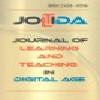Formative Learning Assessment with Online Quizzing: Comparing Target Performance Grade and Best Performance Grade Approaches
Formative Learning Assessment with Online Quizzing: Comparing Target Performance Grade and Best Performance Grade Approaches
Formative learning assessment, Low-stakes, Online Quizzing Best Perfomance, Target Performance,
___
- Andergassen, M., F. Modritscher, and G. Neumann (2014), “Practice and Repetition during Exam Preparation in Blended Learning Courses: Correlations With Learning Results,” Journal of Learning Analytics, 1 (1), 48-74.
- Angus, S.D. and J. Watson, (2009), “Does regular online testing enhance student learning in the numerical sciences? Robust evidence from a large data set,”British Journal of Educational Technology, 40 (2), 255–272.
- Bell, B., and B. Cowie, (2001), “The Characteristics of Formative Assessment in Science Education,” Science Education, 85, 536–553.
- Brown, E., G. Gibbs, and C. Glover, (2003), “Evaluation tools for investigating the impact of assessment regimes on student learning. Bioscience Education, 2:1, 1-7. Cohen, J. & P Cohen, (1983), Applied Multiple Regression/Correlation Analysis for the Behavioral Sciences, Hillsdale, New Jersey: Erlbaum Press.
- DeSousa, E. and M. Fleming, (2003), “A Comparison of In-Class and Online Quizzes on Student Exam Performance,” Journal of Computing in Higher Education, 14 (2), 121-134.
- Gikandi, J.W., D. Morrow, and N.E. Davis, (2011), “Online formative assessment in higher education: A review of the literature,” Computers & Education, 57, 2333–2351.
- Hagstrom, F., (2006), “Formative Learning and Assessment,” Communication Disorders Quarterly, 28(1). 24–36.
- Jacoby, J.C., S. Heugh, C. Bax, and C. Branford-White, (2014), “Enhancing learning through formative assessment,” Innovations in Education and Teaching International, 51 (1), 72–83.
- Kupper-Tetzel, C.E., E. Erdfelder, and O. Dickhauser, (2014), “The lag effect in secondary school classrooms: Enhancing students’ memory for vocabulary,” Instructional Science, 42:373 388.
- Roediger III, H.L. and J.D. Karpick, (2006), “The Power of Testing Memory: Basic Research and Implications for Educational Practice,” Perspectives on Psychological Science, 1 (3), 181- 210.
- Tulving, E., (1967), “The Effects of Presentation and Recall of Material in Free-Recall Learning,” Journal of Verbal Learning and Verbal Behavior, 6, 175-184.
- Wellington, W., D. Hutchinson, and A. J. Faria, (2015), “The Effectiveness of Online Quizzing as a Repetitive Learning Tool in a Marketing Class: A Field Study of the Testing Effect,” Developments in Business Simulation and Experiential Learning, 42, 42-49.
- Yayın Aralığı: 2
- Başlangıç: 2016
- Yayıncı: Mehmet Akif Ocak
Gamification Design to Increase Motivation in Online Learning Environments: A Systematic Review
Kübra ERTAN, Selay ARKÜN KOCADERE
Süleyman Erkam SULAK, Seher ÇETİNKAYA, Alperen Şükrü ÇAPANOĞLU
Pınar KORUKLUOĞLU, Mine ÇELİKÖZ, Mehmet GÜROL
İlyas AKKUŞ, Pelin YÜKSEL ARSLAN
An Application of Personalized Adaptive Learning Systems in Calculus I Course
Ramazan ATASOY, Ömür ÇOBAN, Murat YATAĞAN
Opinions of High School Students About Distance Education in Pandemic Process
